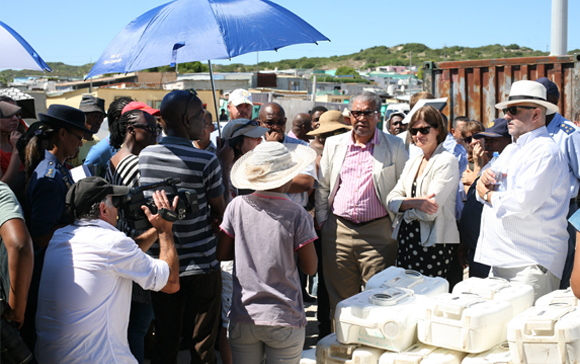Inequality breeds discontent, experts warn
01 December 2014 | Story by Newsroom
Despite a growing middle class, inequality is huge and may even increase as the economy continues to battle, fuelling growing anger and dissatisfaction among South Africans, say leading South African academics
The South African middle class has grown from 300 000 in 1993 to four million today. But while this shows that some wealth has been redistributed, there may have been a corresponding rise in inequality, maintains UCT Deputy Vice-Chancellor Professor Crain Soudien.
Speaking in Stellenbosch at the Carnegie3 (C3) Western Cape Regional Workshop on poverty and inequality, Soudien, who chairs the national C3 initiative, added that while many other developing countries had experienced an increase in national income along with a positive flattening-out effect on inequality, this was not the case in South Africa.
The workshop was attended by academics, government officials and leaders from civic organisations, including Dr Francisco Ferreira, the World Bank's chief economist for the Africa region, who painted a sobering picture of inequality on the continent. Seven of the ten most unequal nations in the world are in sub-Saharan Africa, he said.
"Sustained economic growth is essential to the fight against poverty in Africa. But growth is not sufficient - shared prosperity will require a reduction in inequality, of outcomes and opportunity," Ferreira said.
Participants said that some of the obstacles to reducing inequality include entrenched systems of education and commerce, where patterns are difficult to break, and the poor provision of essential services such as policing and health, along with sluggish economic growth.
Inequality in educational outcomes is hard to fight, said Penny Vinjevold, superintendent-general of the Western Cape Education Department. Vinjevold argued that although there has been much improvement in the quality of education in the province, big challenges remained - including finding ways of getting good teachers to work in schools in poor areas.
Crime, of course, affects every level of a community's functioning - not just education, said Judge Kate O'Regan, commissioner of the Khayelitsha Commission set up to investigate policing in Khayelitsha. High levels of crime in poor areas such as Khayelitsha are linked to a lack of trained and efficient police officers, which means that the police struggle to provide adequate services to the poor, said O'Regan.
"One of the key findings [of the commission] was the police-to-population ratio, which means the number of police deployed in Khayelitsha is very low considering the crime rates and the complexity of policing in an area like that."
The quality of public service from a health perspective was also examined by Lilian Dudley, director of the Centre for Health Systems and Services Research at the University of Stellenbosch, and her colleague, Dr Lungiswa Nkonki. They pointed to the discrepancy between the quality of care in public and private hospitals, stating that despite the well-publicised healthcare needs of the majority of South Africans, only one out of every 10 psychologists were working in the public service, and only three out of every 10 medical doctors were working in government hospitals - the majority working in private healthcare.
Shivani Ramjee of UCT's Department of Actuarial Sciences pointed to the large private health sector as a potential resource that could assist in the envisaged National Health Insurance (NHI) system, by supplementing the quality of care that people outside of the medical schemes currently enjoy. Rather than seeing the large private health system as something to lament, we should look at ways in which its human and physical resources could contribute to better health for all. This required very careful consideration of the design of the NHI, said Ramjee.
Ben Cousins, the DST-NRF Research Chair in Poverty, Land and Agrarian Studies (PLAAS) at the University of the Western Cape, agreed.
"Poverty may have decreased a little, but inequality is proving to be much more stubborn," said Cousins. He attributed this largely to how South African society and the economy were structured and where systems favoured a few large corporations but made it near impossible for smaller industry players and entrepreneurs to enter the market.
"Inequality ties in directly with feelings of unhappiness, anger and levels of dissatisfaction," said Cousins. "When people find that no matter how hard they work, they can't get ahead as others do who might have stronger political connections - that is a breeding ground for discontent."
In the past 20 years the government has implemented several initiatives to reduce poverty and inequality, including the grant system, which had a positive but limited effect, said Servaas van der Berg, DST-NRF Research Chair in the Economics of Social Policy at the University of Stellenbosch.
"South Africa needs economic growth and better education to create employment and ensure that more people can share in its benefits," he said.
Story by staff reporter. Image by Yasser Booley for the Khayelitsha Commission of Inquiry.
 This work is licensed under a Creative Commons Attribution-NoDerivatives 4.0 International License.
This work is licensed under a Creative Commons Attribution-NoDerivatives 4.0 International License.
Please view the republishing articles page for more information.










